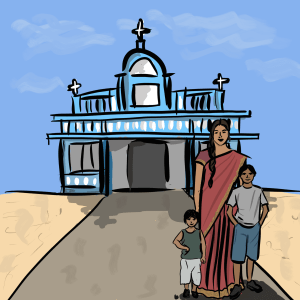Shanthi sits in the shade of a Neem tree beside an old church in Mullaitivu. She is a mother of two, husband-less, but not a widow. She works at a pre-school, and though she can only afford to pay her children’s school tuition every other month, she feeds them three times a day. “That’s what important,” she says. “We don’t need luxury.” A devout Christian, she possesses a deep resourcefulness, enriched from the reservoir of her faith, even as she speaks of her experience during the end of the war. “If we are still here speaking to you, it is because of God’s grace. Rounds went past us every day and one of them could have easily killed us. There was blood in the sand, no matter where we stepped, blood in the sand.”
 Shanthi was born in Mannar in 1983 and lived most of her early years in a hostel after her parents passed away when she was six. In her twenties she worked as a secretary at a local NGO in Jaffna and met her husband Bala. After their marriage, they moved to Puthukudiyiruppu where Shanthi had her two children and began to work as a caregiver. While living in Puthukudiyiruppu in 2009, they became trapped in the final stages of the war and there seemed to be no escape from the killing. When Suthanthirapuram was marked as a safe zone, civilians moved to the area, only to be attacked by the government. “Safe zone or not, young or old,” Shanthi recalls, “the attacks were everywhere and people were dying everywhere.” Shells dropped straight into the bunkers. A father was killed as he changed the clothing of his deceased daughter. Others died from starvation. In those last months of the war, death had many horrific names.
Shanthi was born in Mannar in 1983 and lived most of her early years in a hostel after her parents passed away when she was six. In her twenties she worked as a secretary at a local NGO in Jaffna and met her husband Bala. After their marriage, they moved to Puthukudiyiruppu where Shanthi had her two children and began to work as a caregiver. While living in Puthukudiyiruppu in 2009, they became trapped in the final stages of the war and there seemed to be no escape from the killing. When Suthanthirapuram was marked as a safe zone, civilians moved to the area, only to be attacked by the government. “Safe zone or not, young or old,” Shanthi recalls, “the attacks were everywhere and people were dying everywhere.” Shells dropped straight into the bunkers. A father was killed as he changed the clothing of his deceased daughter. Others died from starvation. In those last months of the war, death had many horrific names.
In April, when the army moved into Mathalan, Shanthi and her family fled with thousands of other civilians. While travelling through the water to escape violence, Shanthi was separated from her husband.
She searched for him for two years, only to later discover he was married to someone else. “I thought it wouldn’t be right to contact him now, so I am just here,” she said, referring to her new life after the war. “It’s because of the war my family got parted.”
Without a network of family or relatives, she felt isolated but managed to find community with her church and the women in the area. Through their support, Shanthi was able to build a house of her own and find work as a preschool teacher. She is invested in the community and provides free tuition classes to children, and spends time with other women, who like her struggle in a post-war context. “We talk about our problems and how to solve them,” Shanthi says as she describes how she manages her household, rotating expenditures every month.

Determined to make changes in her community, Shanthi focuses on even the most basic human needs. “Water is the biggest problem to us,” she says, describing the lack of access to portable water. “We have seminars often at preschool that will go up to 6:30. After they finish, I can’t go take a bath and leave my kids at home. Also, people will talk if I go after that time.” Undaunted, Shanthi and her community members write to officials on this matter along with other pressing issues such as the lack of employment for marginalized women. Though the government officials only visit them during the election time, she remains faithful, steadfast in her belief in herself and in others. At the end of the war, she had witnessed unimaginable atrocities but also profound resilience and solidarity: “We dug bunkers together to protect ourselves. We went together to bathe because of the lack of water. People were united at that time, no matter the circumstances.”
To see the Tamil translation of this story please click here.
